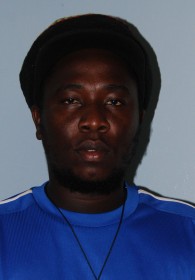Former coach of the Golden Jaguars team Wayne `Wiggy’ Dover says he is relishing working in his new professional environment.

Since relinquishing ties with the Golden Jaguars and Alpha United football teams, where he served as head coach, Dover, along with Kavin Pearce, have landed contracts with Caledonia AIA in Trinidad and Tobago.
Speaking with Stabroek Sport prior to returning to the twin-island republic, Dover said himself and Pearce have been contracted for an initial period of two seasons.
“Entering into the new environment we’ve seen the difference between the Pro League in Trinidad and football at home where the football is much more organised and structured.
“It’s a professional environment to work in and seeing that our talent is right up there with the players in Trinidad if our football administrators do the things to harness that talent we can be a force in the Caribbean and further afield,” he said.
Dover said the essential difference between football in Guyana and Trinidad was the approach.
“The administrators in Trinidad see the game from a professional standpoint,” he said pointing out another difference was the fact that there was a professional league in Trinidad and none in Guyana.
He also pointed to the support of government and the business community as reasons why football in Trinidad is going places.
Pro League
Dover said the Pro League is comprised of 11 first division clubs.
“They have this reserve league which is the feeder for the Pro League and then they have the Super League.
“The Super League is a competition just under the Reserve League. Matches are played on Sundays. If you win the Super League and you have the financial backing you can get into the Pro League,” he recounted.
Dover explained that Pro League clubs have 30 players but only 18 players can make the squad on any match day.
“So to keep those 12 other players match fit they have created the Reserve League so every Thursday there is a Reserve League match for the players who did not make the first team,” he said.
Caledonia AIA is owned by Jamaal Shabazz, who served as technical director of the Guyana Football Federation.
Dover said the club receives sponsorship from companies in Trinidad such as Neal and Massy, NLCB, Play Whe and Sports Company.
He pointed out that the companies receive their mileage from the fact that all the team jerseys, training uniforms and match bibs have the logos of the sponsors on them.
“At present I’m the assistant coach with the Pro Team but I am in charge of the Reserve Team,” he disclosed.
Dover said the Pro League will be played over two rounds and will conclude in December.
Interspersed in between are several knock out competitions.
While Caledonia AIA have not yet won the Pro League they are the defending champions in two knock out tournaments.
“At the moment we are fifth in the point’s standings in the Pro League competition.
“We have never won the league but presently we are the defending Courts Pro Bowl and the FA Cup champions, two knock out tournaments organized by the Trinidad and Tobago Football Federation (TTFF).”
Dover said while the players as professionals, are expected to purchase their own football boots, all the other equipment are provided by the club, inclusive of “training gears, bibs, balls, all the medical supplies, water, ice everything…”
Dover, who admits that he still has an interest in seeing Guyana’s football develop, said that the lack of corporate and government support was stifling local football.
Trinidad government supports football
“The Trinidad and Tobago government gives 50,000 TT dollars to each club in the Pro League at the start of the season so they can go through their pre season preparation without any hindrance.”
Additionally, Dover said, players are paid for playing in the Pro League.
“The salary ranges from TT$3000 to TT$10,000 a month. A young player who is now getting into the league starts at TT$3000.”
This, he said, was in stark contrast to clubs in Guyana who do not pay their players yet are sometimes reluctant to allow them transfers.
There are also other incentives financially.
“If you make the final 18 you get 100 TT dollars, if you start you will get 200 TT dollars additionally,” he revealed.
Training at Caledonia
“We do two sessions sometimes a day. When it’s competition time we wind it down to one session a day.
“Starting time is 9am until 11 and we resume from 5.30pm and train until 7.30 in the evenings,” he said.
Dover said the bulk of the physical work would be done during the pre season so that when competition time comes around there is no need for such physical work load.
“So you mostly spend time on tactical and technical training. You will still undergo speed and strength endurance training to maintain the level of fitness throughout the season,” he explained.
Dover said the club has a coach with a fitness back ground who is responsible for all the physical and strength training with the team.
He is even involved in the tactical aspect although Shabazz is in charge of that aspect.
“I think we really need corporate sponsorship and government on board so that we can develop the sport and bring the football so it can be comparable with Trinidad.
“The players in Trinidad are properly prepared mentally, physically, technically and tactically, compared to our players who train for 30-45 minutes in the afternoons and as you know, a football game is 90 minutes. So that tells you the story right there.”
Dover, who returned to Trinidad on Friday declared: “I would like to see more local players coming out there and plying their trade to help the programme back home as well as a few more coaches.
“While information is important, being in a practical situation helps to enhance and I know for sure that Jamaal is always willing to help other Guyanese in this respect.”





